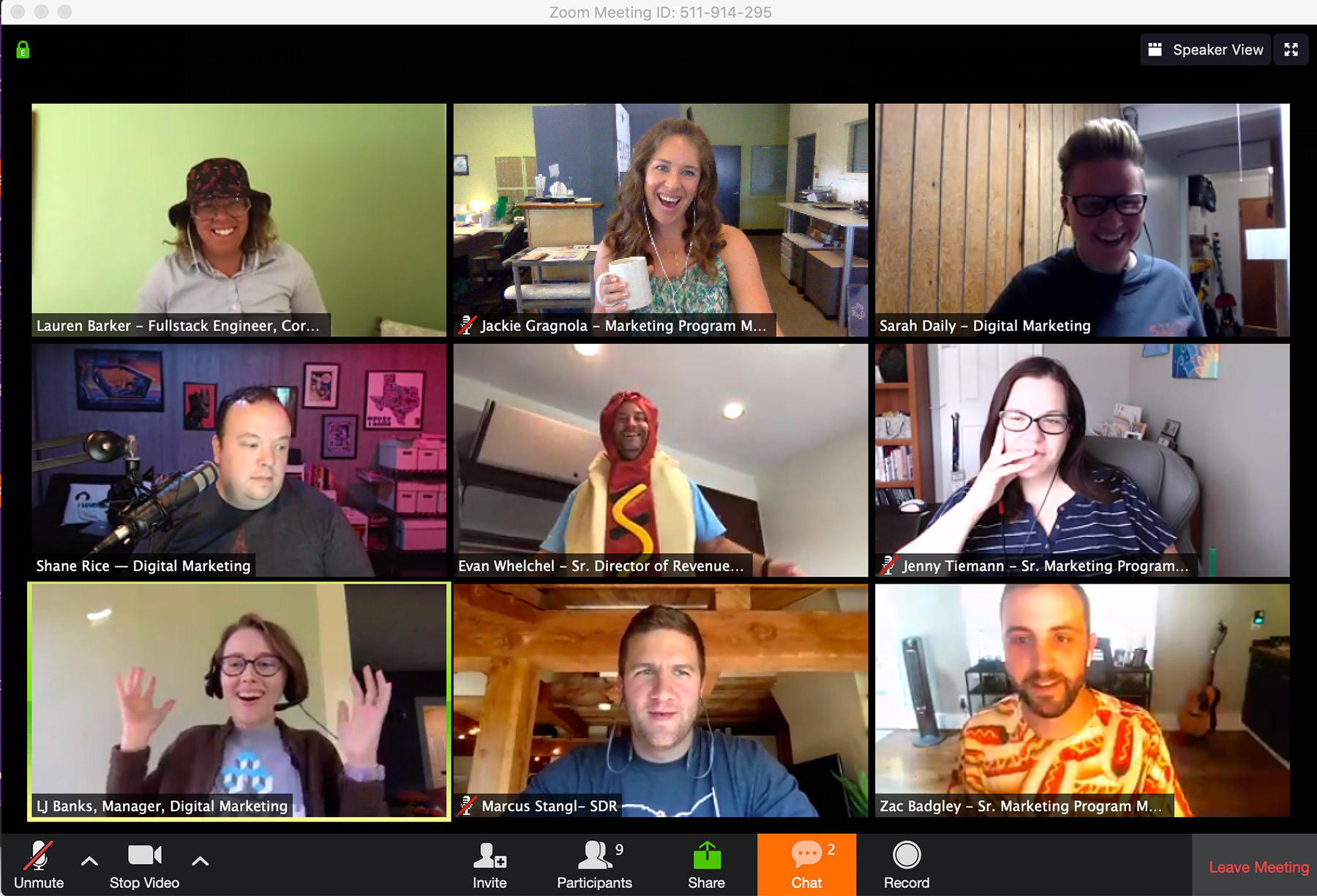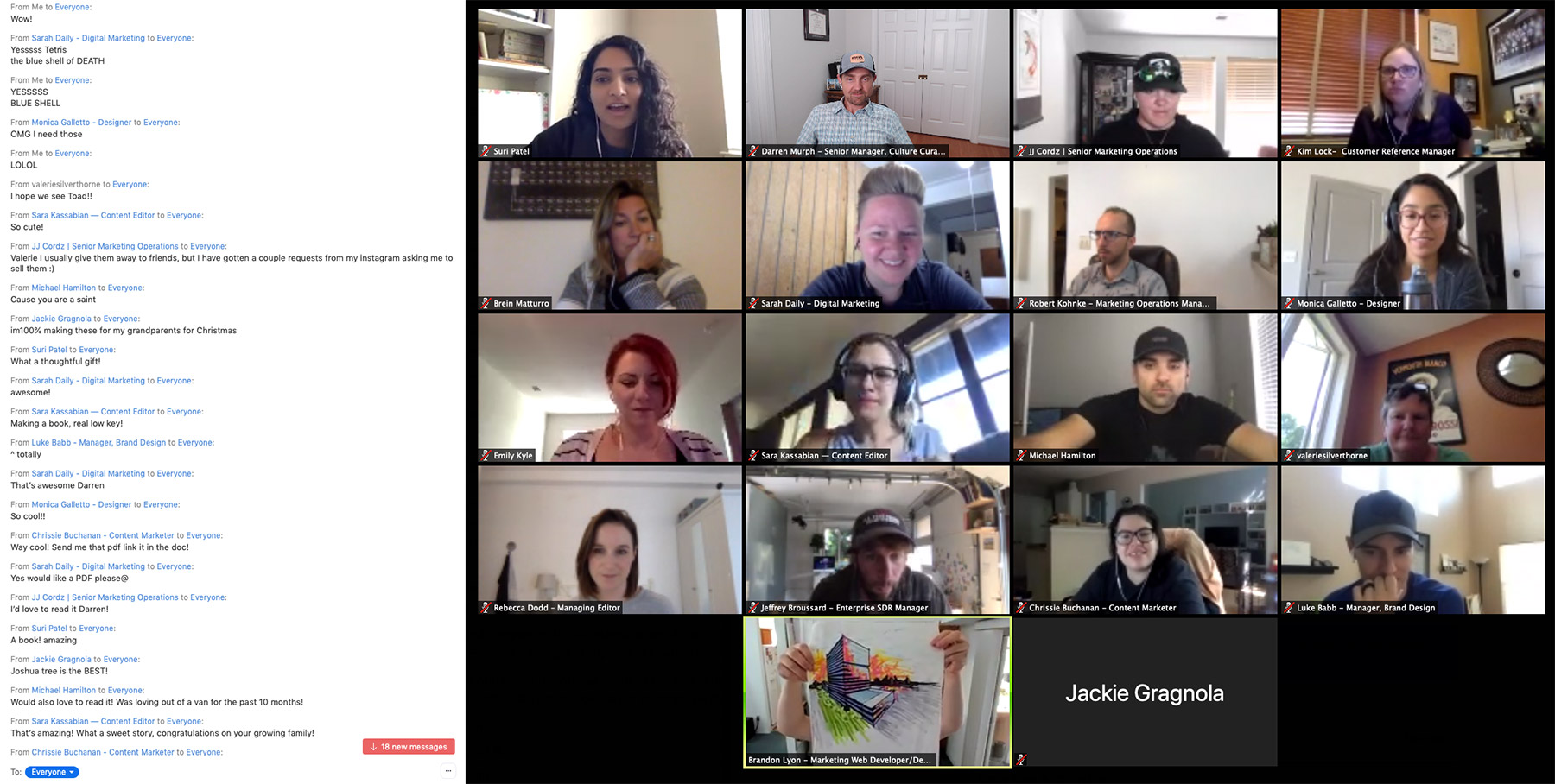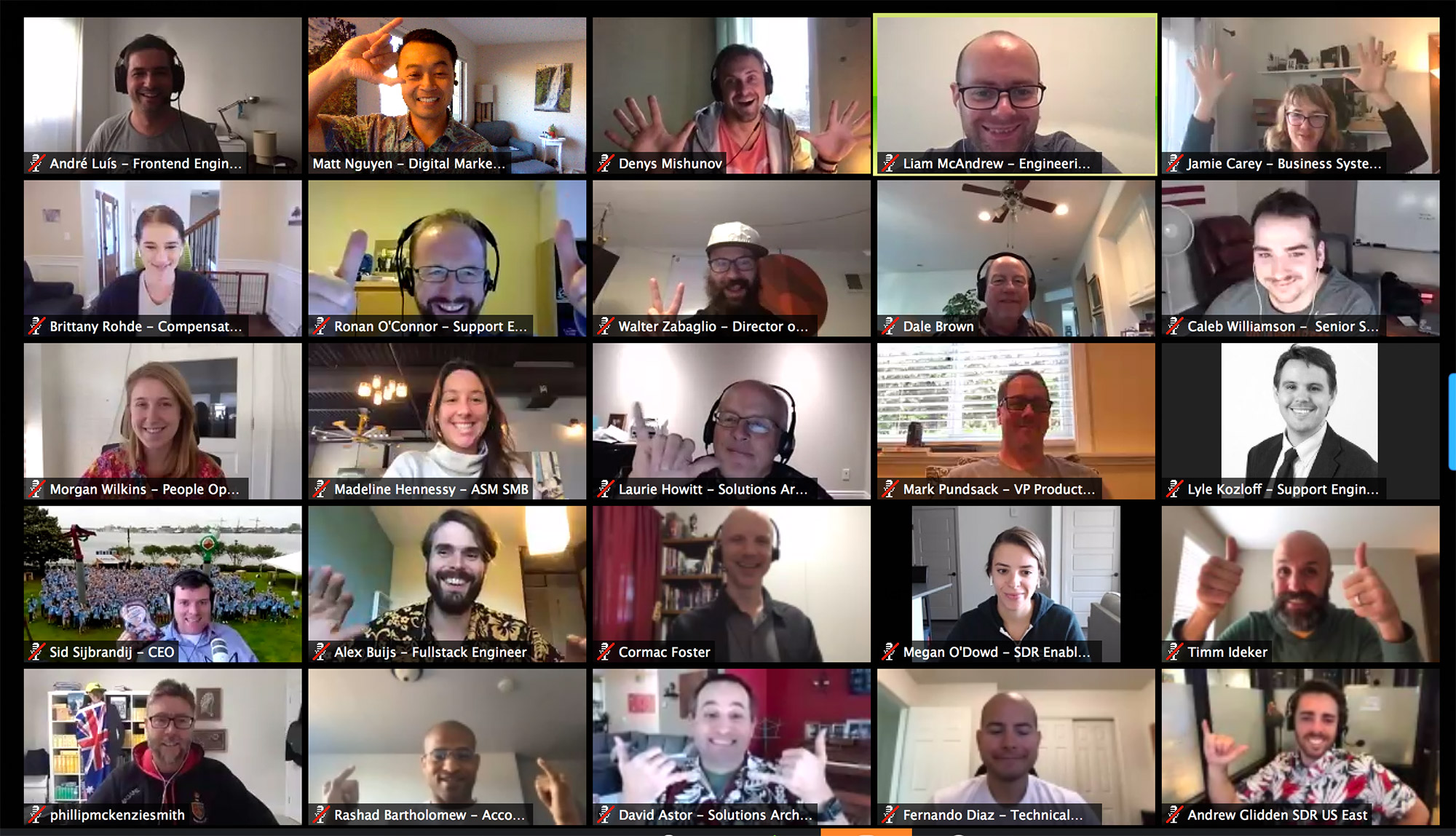- You are here:
- About GitLab
- GitLab Culture
- All Remote
- Informal Communication
On this page
- Introduction
- Formally design informal communications
- Devote time to fostering relationships
- Using emojis to convey emotion
- Coffee chats
- Scheduling a Coffee Chat
- The Donut Bot
- GitLabber Mixer Calls
- Scheduling a Coffee Chat
- Team Social Calls
- Celebrations and holidays
- Coworking calls
Introduction
On this page, we’re detailing how informal communication occurs at GitLab, and why it matters in an all-remote culture.
Formally design informal communications
In colocated environments, informal communication is naturally occuring. When individuals are physically located in the same space, there are ample opportunities to chitchat and carry on conversations outside of formal business settings.
Making social connections with coworkers is important to building trust within your organization. One must be intentional about designing informal communication when it cannot happen more organically in an office.

Group social calls are a great way for remote teams to connect and bond
Informal communication is important, as it enables friendships to form at work related to matters other than work. Those who feel they have genuine friends at work are more likely to enjoy their job, perform at a high level, feel invested in the company, and serve others within the organization. At GitLab, we desire those outcomes as well, reinforcing our Results value.
For all-remote companies, leaders should not expect informal communication to happen naturally. There are no hallways for team members to cross paths in, no carpools to the office, etc.
In the video above, GitLab co-founder and CEO Sid Sijbrandij discusses informal communication within an all-remote company with Vlad Lokshin, co-Founder and CEO at Turtle.
If you do all-remote, do it early, do it completely, and change your work methods to accommodate it. Be intentional about informal communication. All-remote forces you to do the things you should be doing anyway, earlier. – GitLab co-founder and CEO Sid Sijbrandij
In an all-remote environment, informal communication should be formally addressed. Leaders should organize informal communication, and to whatever degree possible, design an atmosphere where team members all over the globe feel comfortable reaching out to anyone to converse about topics unrelated to work.
Devote time to fostering relationships

GitLab marketing team Show & Tell social call
In all-remote environments, there should be a greater emphasis placed on carving out time to get to know one another as humans. To connect and bond as empathetic beings with interests, emotions, fears, and hopes — people, not just colleagues.
If you’ve spent any length of time in a corporate setting, you’ve probably seen a company institute a weekly or monthly “happy hour,” designed to gather employees in a shared space to converse about topics unrelated to work.
For colocated companies, the occasional team offsite — to take in a sporting event, to enjoy a shared lunch, etc. — may be enough to supplement naturally occuring informal communication in the office.
Below are a number of intentional facets of GitLab’s culture, created to foster informal communication. We welcome other all-remote companies to iterate on these and implement as desired.
- Company call: A daily team video call with an agenda where everyone is free to add subjects they’d like to discuss with the whole company.
- Breakout calls: Following the company call, everyone breaks out into small groups for 10-15 minutes to talk about non-work-related topics.
- Contribute Unconference: An in-person, week-long event where we bring the entire company together in one location to get to know each other better.
- Group conversations: Four times a week the company gets together virtually to discuss an area of the business. Slides are provided for context but not presented.
- Coffee chats: More details below.
- Coworking calls: More details below.
- Social hours: Informal social calls organized within our immediate teams to get to know each other on a more personal level.
- Visiting grants: This travel stipend encourages team members to visit each other by covering transportation costs up to $150 per person they visit.
- Local meetups: Co-located team members are encouraged to organize their own meetups, whether it’s a coworking space or getting dinner together.
- CEO house: Team members can get together in Utrecht, Netherlands, at the CEO’s AirBnB, free of charge.
- Slack: We use Slack channels for informal communications throughout the company, whether it’s a team-specific channel or a channel dedicated to sharing vacation photos with other team members.
- Zoom calls: Not only do we get to know our coworkers better by seeing them in real time during video calls, we also get to know their pets and families too. This visual engagement helps us relate to each other on a more personal level, so when we meet in person, we already know each other. In fact, when our team members meet face-to-face for the first time, the most surprising factor is usually each person’s height.
“I’ve been given a tour of team members’ new houses, admired their Christmas decorations, squealed when their pets and kids make an appearance and watched them preparing dinner – glimpses into the personal lives of my colleagues that I’ve never had in any office job.” – Rebecca, Managing Editor, GitLab
Using emojis to convey emotion
Though emojis have commonly been reserved for personal conversations that occur outside of the workplace, all-remote employees should feel comfortable using them in everyday discourse with team members.
Perception has shifted on using emojis in professional settings. In Slack alone, north of 26 million custom emojis have been created since the feature was introduced. In all-remote settings, where you may never meet a colleague in person, leveraging visual tools to convey nuance in tone, emphasis, and emotion can lead to more emphathy and a tighter human connection.
Using emoticons, emoji, and stickers can supplement the lack of human nonverbal cues in computer-mediated environment. The results show that proper use of emoticons, emoji, and stickers, especially positive emoticons, is conducive to both relationship formation and cognitive understanding. They not only help participants express emotions and manage interrelations but also function as words to aid message comprehension. – Ying Tang and Khe Foon Hew, researchers at the University of Hong Kong
Too, emojis can create a more inclusive communication environment. When you’re working with colleagues where the de facto business language isn’t someone’s first language, more universal indicators (e.g. “eyes” for “I’ve seen this” or “smile” for positivity) can reduce the mental burden of deciphering a message.
Coffee chats
In the Traction Conference video above, GitLab co-founder and CEO Sid Sijbrandij shares how remote teams can stay connected with Frederic Lardinois of TechCrunch.
We understand that working remotely leads to mostly work-related conversations with fellow team members, so everyone at GitLab is encouraged to dedicate a few hours a week to having social calls with anyone in the company.
It’s a great chance to get to know who you work with, talk about everyday things and share a coffee, tea, or your favorite beverage. We want you to make friends and build relationships with the people you work with to create a more comfortable, well-rounded environment.
Scheduling a Coffee Chat
GitLab Team Members can easily schedule a Coffee Chat in Google Calendar and link it to Zoom, with a 1-click link to the video call.
Watch this short video to see how it’s done.
- Search for the person in Google Calendar
- Click the time and name the meeting Name / Name coffee-chat
- Click on Make it a Zoom meeting
Google Calendar will warn you if the time is outside the other person’s working hours, and you can select from a list of suggested times.
The Donut Bot
Team members can join the #donut_be_strangers Slack channel to be paired with a random team member for a coffee chat. The “Donut” bot will automatically send a message to two people in the channel every other Monday.
Please schedule a chat together, and Donut will follow up for feedback.
Of course, you can also directly reach out to your fellow GitLab team-members to schedule a coffee chat in the #donut_be_strangers Slack channel or via direct message.
GitLabber Mixer Calls
Similar to a coffee chat, a “GitLabber Mixer” call aims to help team members meet more folks from other groups or functions that they might not otherwise get to spend a lot of time working or interfacing with.
To set up a GitLabber Mixer, two team-members set up a single Zoom line. Using the single Zoom line, each of those team members invites someone else to join – making a total of four team members on the call. This way, you’ll get to meet someone new – or find connections between team members you didn’t know existed. Each “host” brings a topic to discuss in case the conversation needs help getting started.
At the end – the host and their co-host’s guest set up another GitLabber Mixer call – with two new guests. In this way, the participation gets spread throughout the organization and connects as many team members as possible.
Team Social Calls

Spreading aloha on a GitLab company call
Some teams at GitLab organize informal social calls on a regular basis in order to build camaraderie.
The data team has them every Tuesday.
Team members and managers are encouraged to create these calls as a medium for informal, agenda-free interaction between team members.
Consider creating a shared calendar for social events to more broadly allow people to join and be aware of social events that are in a more convenient time zone. For example, GitLab’s marketing team has a “Show and Tell” call where team members are encouraged to display something they’ve crafted and share the story behind it.
Celebrations and holidays

A bit of Airplane! fun on Halloween
A team that is distributed across the globe creates opportunity for many celebrations. Different countries and cultures celebrate in their own way, enabling team members to gain an understanding of key dates and events that matter to colleagues. A culture that encourages a team to thoughtfully express their celebrations on company calls is a healthy, inclusive one.
Teams can also arrange shared meals around the world. Global pizza parties, for example, are possible to document and enjoy in a shared setting (Zoom or Slack), though one may wish to consider a breakfast pizza depending on time zone.
Coworking calls
These video calls are scheduled working sessions on Zoom where team members can work through challenging tasks with a coworker, or simply hang out while each person works on their own tasks.
This recreates a productive working session you might have in person in a traditional office setting, but from the comfort of your own desk.
Want to try advanced mode? Screen share as you work together (keeping in mind any confidentiality issues).
Return to the main all-remote page.
